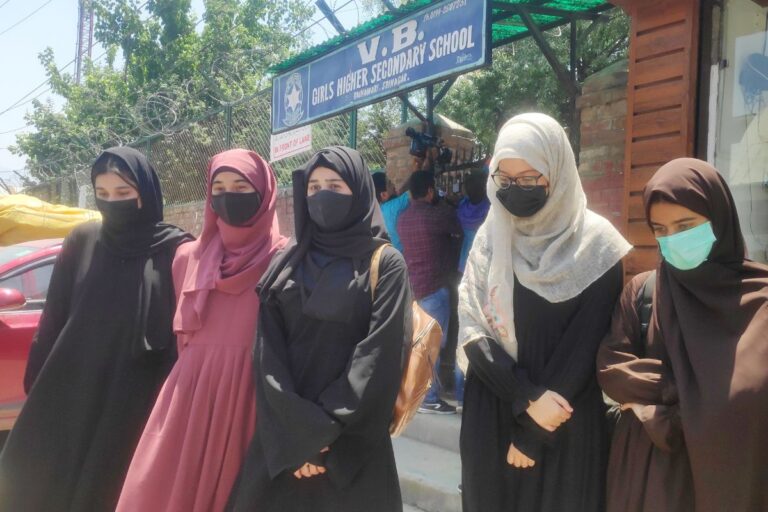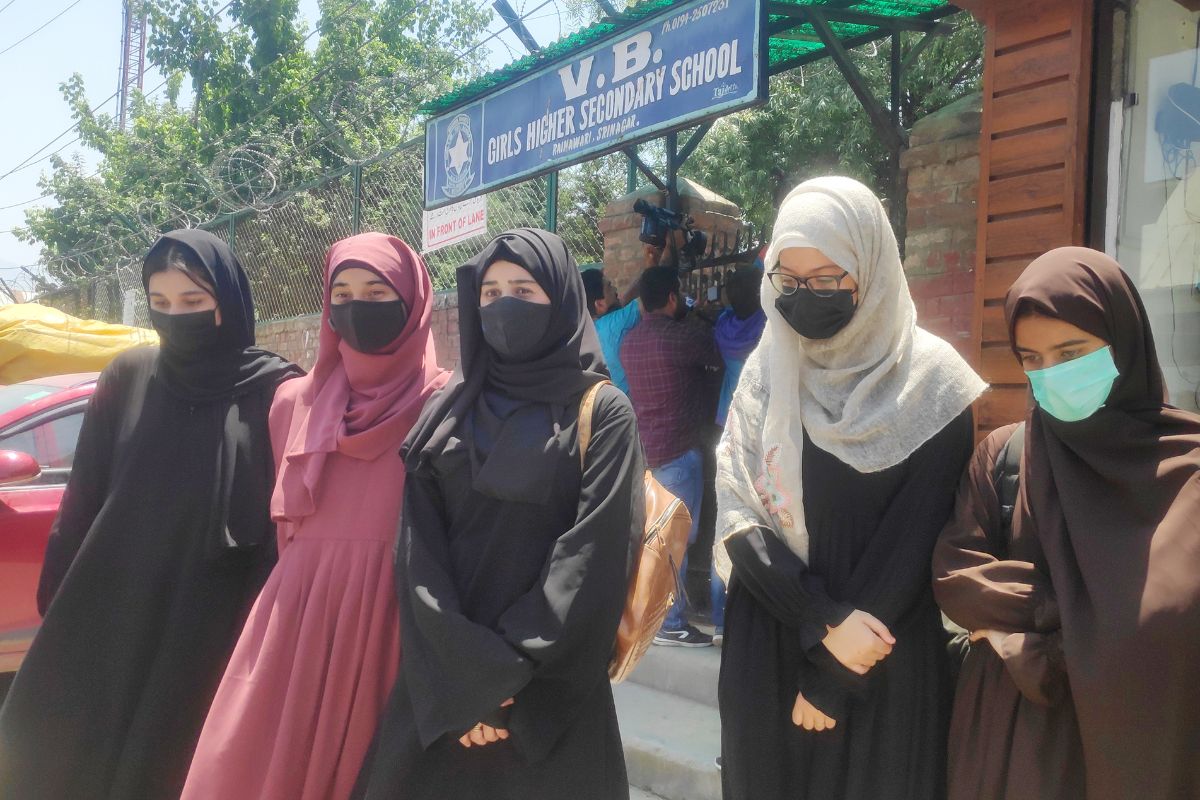
Students Denied Entry into Srinagar School Over Hijab “We were told to go to a Madrassa if we wanted to wear an Abaya,” said one protesting student. Due to the hijab, students in a Srinagar school are being excluded. Due to their hijabs, a group of female students were recently Continue Reading…
Newz Quest
authentic transparent "NEWS" excerpts…

Students Denied Entry into Srinagar School Over Hijab “We were told to go to a Madrassa if we wanted to wear an Abaya,” said one protesting student.
Due to the hijab, students in a Srinagar school are being excluded. Due to their hijabs, a group of female students were recently barred from entering a Srinagar school. This incident has sparked debate and brought up issues of discrimination against Muslim students as well as the violation of religious freedom.
Srinagar: Several female students of Vishwa Bharti Higher Secondary School here staged a protest against its administration on Thursday, alleging that they were denied entry to the institute for wearing abaya.
A loose-fitting, full-length robe, Abaya is worn by Muslim women. We were not allowed inside the school,” said one of the protesting students. The students alleged the school administration told them they were “ruining the atmosphere of the school” by wearing ‘abaya’. School principal Memroz Shafi said the students have been told that they can wear abaya from home to school, but they should take it off inside the school premises.
“We told them to wear a long white-coloured Hijab or a large dupatta as that is part of the school uniform. The principal said the students should follow a proper dress code in order to maintain decorum in the school. National Conference (NC) chief spokesperson Tanvir Sadiq said it was unfortunate to witness such incidents in Muslim-majority Jammu and Kashmir. “Wearing a Hijab should be a personal choice, and there should be no interference in matters of religious attire. The NC chief spokesperson said the party opposes the school directive and urged the administration to take immediate corrective action
The incident’s effects on the affected students and the larger community should be discussed. The incident in which Muslim students in Srinagar were turned away from a school because they wore a hijab has had a significant effect on both the affected students and the larger community.
Schools must have equality and conduct guidelines that do not treat students differently based on their attire or religious convictions. Schools must promote an inclusive culture where all students are treated with respect and consideration. This can be done by implementing education and awareness campaigns that value diversity and cultural sensitivity. Schools must also make sure that their anti-discrimination policies adhere to all applicable laws and regulations. By doing this, they can stop discrimination from happening and make the classroom a safe place for all students to learn and develop. Schools must respect students’ right to practise their religion freely and provide for their needs when they dress in a way that reflects their beliefs. In the end, it is the duty of schools to Maintain the principles of equality, fairness, and respect for all students, regardless of background or beliefs.
The Karnataka Hizab row had political overtones and was intended to split communities along religious lines. Such actions only serve to widen already existing gaps and foster mistrust between people. It is crucial that we acknowledge the negative effects of such polarising politics and work to forge connections between different communities. This can be done by promoting interfaith dialogue, participating in cultural exchange programmes, and organising community service projects that unite people from various backgrounds. We can remove barriers and create a more inclusive society where everyone feels valued and respected by working together to achieve a common goal. As educators, we have a special responsibility to mould the minds of the next generation and instill in them the virtues of empathy, compassion, and forgiveness. Let us work together to create a world where diversity is celebrated and differences are viewed as assets rather than liabilities.
Read High Court Judgement below:
Schools should promote education rather than a particular religion or cultural background. Schools can create an environment that promotes learning and understanding by embracing diversity and inclusion. This can be done by taking part in multicultural events, taking language classes, and having teachers receive sensitivity training, among other things. Schools must be aware of the particular needs of each student and offer assistance as needed. This might entail providing counselling services or making spaces where students can freely express themselves. We can assist students in gaining a deeper understanding of various cultures and viewpoints by encouraging diversity and inclusion in the classroom. They will gain from this not only in their academic endeavours but also in preparing them for the increasingly globalised world they will enter once they graduate. Ultimately, it is up to educators to pave the way toward a more tolerant and accepting society, one that celebrates rather than fears differences.,
In India, the right to education does not necessarily mean favouring one religion over another; rather, it means ensuring that all children, regardless of their background, have access to high-quality education. This includes addressing problems like discrimination, poverty, and gender inequality. Additionally, educators must give students the abilities they need to succeed in a world that is changing quickly, including critical thinking, problem-solving, and digital literacy. The next generation can be better prepared for success in a globalised economy that values inclusivity and diversity if we do this. We can only remove obstacles and create bridges between cultures and communities through education. As educators, it is our duty to cultivate an atmosphere of respect and cooperation so that everyone can have a better future.. We can create a more just and equitable society where everyone has the chance to realise their full potential by working together.
Like what you’ve read? Subscribe to our blog by adding your email address to the form. You’ll be the first to hear about our updates as soon as they are published in! Did you find our blog insightful and helpful? Feel free to share on Twitter or Facebook by using the super-easy share buttons!
